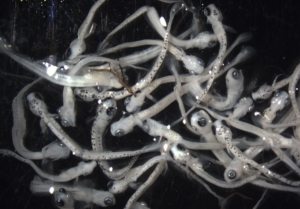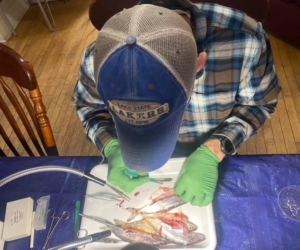Food Webs
Food webs are integral to Great Lakes sustainability. Learn more about our contributions to their stability below.
Lake Whitefish Recruitment
Lake Whitefish are an economically, recreationally, and culturally important species in the Great Lakes. However, this important species has been on the decline since the 1990s, coinciding with the invasion of zebra and quagga mussels. Invasive mussels have profound impacts on aquatic systems, especially in the lower food webs. One hypothesis for Lake Whitefish declines is decreased zooplankton prey, a critical food source for fish during their larval stage.
CFRE, in collaboration with several tribal, state, and federal agencies is conducting research on Lakes Michigan, Huron, and Superior to further understand the causes of declining Lake Whitefish populations.
Lake Superior Food Web Dynamics
Working with the Michigan Department of Natural Resources and Northern Michigan University researchers, CFRE researchers are helping to better understand the current status of the Lake Superior food webs.
CFRE researchers are processing diets for >6,000 fishes collected throughout the lake that represent common prey species such as Cisco, Lake Whitefish, Rainbow Smelt, and sculpins. Fish diet data is important to understanding food web linkages and overall ecosystem health.



